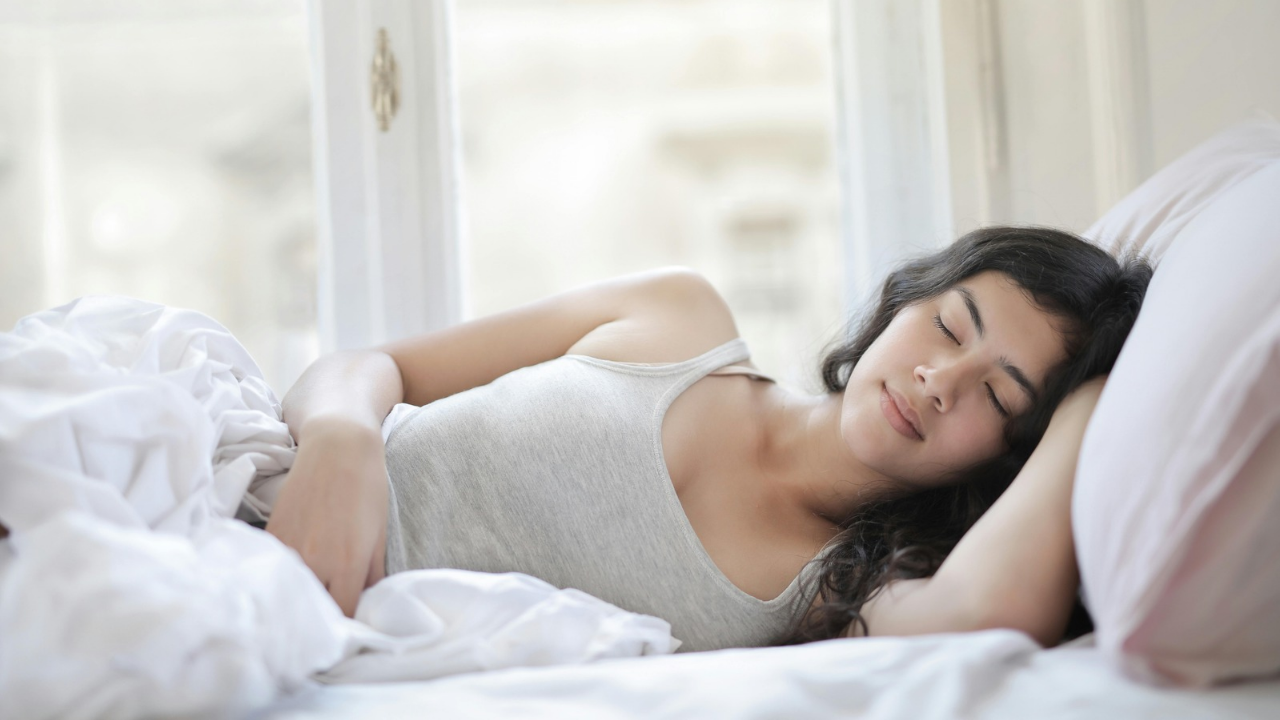How to Sleep Better Naturally: 10 Easy Tips Without Taking Any Medicine
Do you find it hard to fall asleep or stay asleep at night? Don’t worry, you’re not alone. Many people struggle with sleep problems these days. But taking sleeping pills is not always a good idea. They can have side effects and become addictive.
The good thing is that there are natural and safe ways to improve your sleep, without using any medicines. In this article, we’ll share 10 simple and effective tips that can help you sleep peacefully at night. These methods are backed by science and easy to follow in daily life.
Here are 10 tips on how to sleep better naturally.
1. Sleep and Wake Up at the Same Time Every Day.
Your body has a natural clock called the circadian rhythm. It is guided by the brain. This rhythm signals your body when to sleep and when to wake up.
The brain produces a hormone called melatonin, which helps you sleep. Sleeping at the same time daily keeps this clock balanced and helps you fall asleep faster. Try to go to bed and wake up at the same time every day, even on weekends
Circadian Rhythm also influences various bodily functions, such as hormone levels, digestion, and body temperature.
However, external factors like light can affect your circadian rhythm. For example, when light enters your eyes, specific cells send a message to the brain to reduce melatonin production, making it harder to fall asleep.
2. Follow a Relaxing Night Routine
Before going to bed, do calm activities like: Reading a book, light stretching or yoga, deep breathing or meditation, listening to soft music, etc.
These things relax your mind and prepare your body for sleep. When we relax, blood circulation improves throughout the body, boosting our energy levels.
This state of calm sharpens our mind, supporting clearer thinking, better focus, improved memory, and wiser decision-making.
Relaxation also lowers heart rate, eases blood pressure, and releases built-up tension. Additionally, it supports digestion, allowing the body to absorb vital nutrients more effectively in a relaxed state.
3. Stay Away from Mobile and TV Before Bed
Don’t use mobile phones, laptops, or watch TV at least 1 hour before sleeping.
Screens give off blue light which stops your body from making melatonin—the hormone that makes you sleepy.
Blue light from your phone is a type of artificial light that mimics natural daylight. During the day, it can help you feel more awake and alert. But at night, it does the opposite – it can make it harder to relax and fall asleep.
Moreover, checking your phone activates your brain, making you feel more alert and awake. Even a brief glance can stimulate mental activity and push back your ability to fall asleep.
Going to bed should be a quiet and relaxing time. But if you look at social media and see something upsetting, it can cause stress or worry.
Even a happy post can make you feel excited. These feelings can keep your mind active and make it harder to fall asleep.

4. Make Your Bedroom Good for Sleep
To create a good sleep environment, keep your room dark by using thick curtains, quiet by using earplugs or background sounds like a fan if needed, and cool by making sure it’s not too warm.
Sudden changes in sound can disrupt sleep and cause you to wake up. To avoid this, choose sleep sounds that are steady and loud enough to block sudden noises. The best options vary from person to person, but commonly used choices include:
White or pink noise: These help mask background sounds; white noise is more layered (eg.fan, cooler), while pink noise (eg. Light rain, river, wind) is softer.
Fans or AC Provide steady ambient noise.
Music – Choose relaxing songs based on your taste.
Nature sounds: Rain, waves, or wind can be calming.
Experiment with different sounds to see what helps you sleep best.
Darkness triggers the pineal gland in the brain to produce melatonin, a hormone that helps you feel sleepy. When you’re exposed to light, this process is stopped. Light blocks melatonin production, making it harder to fall asleep and stay asleep.
Why is it better to keep your bedroom cool at night? Your body temperature changes throughout the day. It starts to drop when you get ready to sleep and hits its lowest point by early morning.
To cool down, your body widens blood vessels in the skin. This makes your hands and feet feel warmer at first as heat escapes. Eventually, their temperature matches your torso.
If your room is too hot or too cold, it can interfere with this natural cooling process. Hence, A peaceful and cool room helps your body relax and sleep better.
5. Avoid Caffeine and Heavy Food at Night
Try not to drink tea, coffee, cold drinks, or eat heavy food 2–3 hours before bed.
Caffeine keeps your brain awake. Caffeine influences the brain by interfering with adenosine receptors.
Adenosine is a natural compound that encourages sleep and accumulates in the brain throughout the day while you’re awake. As adenosine levels rise, you begin to feel more tired.
However, when caffeine blocks these receptors, it prevents the sleep-inducing effects of adenosine, helping you stay awake and attentive.
Having a small snack before bed can help keep your blood sugar steady and reduce cravings, which might make it easier to fall asleep.
However, eating too close to bedtime can lead to problems like acid reflux, heartburn, weight gain, and disrupted sleep, which may outweigh the benefits.
To avoid these issues, experts suggest finishing your last meal at least two hours before going to sleep.
6. Get Sunlight in the Morning
Spend some time in natural sunlight, especially in the morning. You can go for a walk or sit near a window.
Sunlight keeps your body clock on track and helps you sleep better at night.
When people are exposed only to natural light, their body clock naturally matches the rising and setting of the sun. They tend to stay awake during daylight and sleep when it’s dark.
In a study of 700 people during the height of the COVID-19 pandemic, those who spent 1 to 2 hours outside each day or stayed in well-lit rooms had fewer sleep problems and felt less anxious.
Other research shows that just 30 minutes of sunlight a day can help set your body’s internal clock and lead to better, deeper sleep.
7. Do Regular Exercise During the Day
Doing light exercise like walking, yoga, or stretching in the day improves sleep. But avoid exercising just before bed.
Exercise reduces stress and makes your body tired in a good way, helping you sleep deeper.
Exercise can improve your sleep in several ways. For one, it helps boost melatonin levels – the hormone that controls your sleep-wake cycle – which can help you fall asleep more quickly and rest more deeply.
It also lowers stress, which is a common reason many people struggle to fall or stay asleep.
Additionally, being active can lift your mood, making you more motivated to continue exercising, which creates a positive cycle.
Studies have found that people who exercise regularly tend to feel more positive and calm during workouts, while also experiencing less fatigue and fewer negative emotions.
Lastly, physical activity plays a role in managing your body temperature. During exercise, your body heats up, and the drop in temperature 30 to 90 minutes afterward helps signal to your body that it’s time to wind down and get ready for sleep.
Some studies suggest that for healthy adults, doing a single session of evening exercise can be helpful compared to not exercising at all.
It not only had no negative impact on sleep but actually helped people fall asleep more quickly and spend more time in deep, restorative sleep.
However, doing high-intensity workouts, like interval training, less than an hour before bed had the opposite effect. It made it harder to fall asleep and led to poorer sleep quality.
8. Use Your Bed Only for Sleeping
Don’t use your bed for watching movies, working, or eating. Use it only for sleep.
Spending too much time in bed feeling awake and frustrated can train your body to associate the bed with wakefulness and stress, rather than rest and sleep. Over time, this negative link can lead to persistent insomnia.
To help break this pattern, go to bed only when you feel genuinely sleepy and use your bedroom solely for sleep.
Your brain will connect your bed with sleep, not with other activities.
9. Try Deep Breathing to Relax
Some studies suggest that slow, deep breathing – especially when practiced as part of relaxation techniques like meditation or yoga – can help increase melatonin levels.
This happens because deep breathing activates the parasympathetic nervous system (your body’s “rest and digest” system), reducing stress and promoting hormonal balance, which may encourage melatonin production naturally.
You can do a simple breathing method like the 4-7-8 technique:
Breathe in for 4 seconds
Hold your breath for 7 seconds
Breathe out slowly for 8 seconds
This calms your mind and helps you feel sleepy.
These breathing techniques are among the oldest and simplest methods known to offer a range of therapeutic benefits for both the body and mind.
10. Avoid Long Naps in the Day
If you sleep too much in the daytime, it may affect your night sleep. If needed, keep naps short (10–20 minutes) and don’t nap after 3 PM.
Short naps are okay, but too much daytime sleep can disturb your sleep cycle.
A short nap can be refreshing and help restore energy, especially when you’re sleep-deprived. However, napping too late in the day or for too long can interfere with nighttime sleep.
Late or extended naps may reduce your body’s natural sleep drive – the internal pressure that builds up to help you fall and stay asleep – making it harder to get quality rest at night.
Tip: Avoid Alcohol and Smoking
Drinking alcohol or smoking before bed can disturb your sleep and make you feel tired the next day.
Conclusion:
Getting good sleep is important for your health, mind, and mood. You don’t need sleeping pills to sleep better.
By following these simple natural tips, you can improve your sleep quality slowly and safely.
Start with 2–3 tips that suit you best. Stay regular, and your sleep will start improving within a few days. If sleep problems continue for a long time, it’s best to talk to a doctor.
Note: This article is based on trusted health and medical sources, including:
Centers for Disease Control and Prevention (CDC)
National Institutes of Health (NIH)
Also read –
Benefits of Beetroot for Health and Skin
These Daily Habits Can Help You Lose Belly Fat in 30 days





Leave a Reply